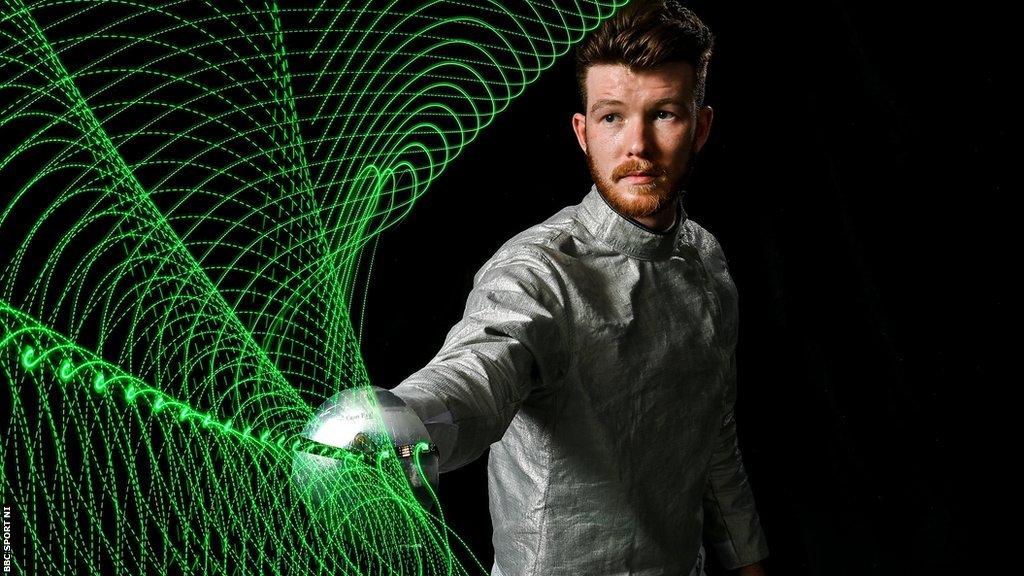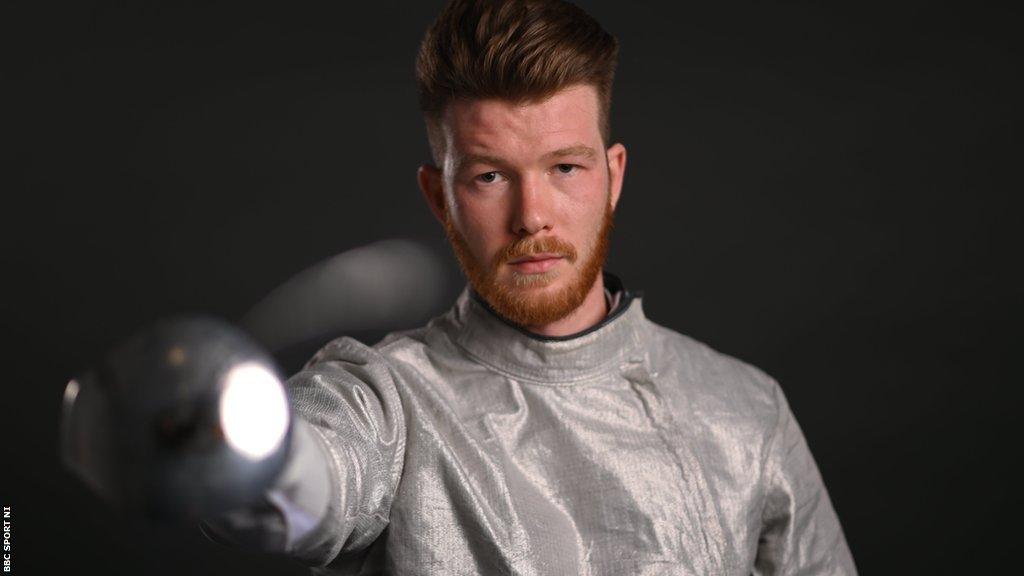Jadryn Dick: How James Bond inspired Irish athlete to take up fencing
- Published

Jadryn Dick will make his fencing debut for Ireland at the upcoming European Games
When you think of James Bond it's the flashy cars, the impressive gadgets and luxurious lifestyle. His sporting prowess is probably not close to the top of the list.
However, for Irish fencer Jadryn Dick, it was all the inspiration he needed to take up the sport.
"I was a big James Bond fan growing up and it's in the film 'Die Another Day' with Pierce Brosnan and Madonna. I remember seeing it in the film and thinking this was awesome," he explained.
"I said to my parents 'do you mind if I give this a go?' because I was playing football at the time. They suggested I kept doing what I was doing, because, although they wanted me to be involved with a sport, they didn't want me chopping and changing.
"After pestering them, they found a club close to where we lived, the Excalibur Community Fencing Club and I would go there every Saturday. I really enjoyed it and made new friends, all because of James Bond," smiles the 27-year old.
Life down under
Dick was born and grew up in Australia. His grandparents had immigrated from Belfast in 1957, when his father was just four years old.
"The boat journey took about three weeks. They passed the equator on my dad's birthday, and he got a certificate from the captain and still has it."
Jadryn's grandfather was Protestant, and his grandmother was Catholic. The promise of a new life saw the family settle in Freemantle in Western Australia.
After marrying an Australian, his dad eventually moved close by to Hamilton Hill, where Dick was born.
The political situation in Northern Ireland wasn't discussed within the family, and Dick had to discover much about his heritage on his own.
"I remember the first time I visited Belfast as an adult, and I was sitting in a pub and hearing 'The Green Glens of Antrim' and thinking I know this song but had no idea where from.
He added: "I called my dad, and he told me that my gran used to play it all the time on the record player, and it was weird it had stuck in my mind.
"My grandmother taught me a little about back home, but we never really got into the politics, and I didn't learn much more about it in school.
"Irish history isn't taught in Australian schools, and I think it should be because there are so many connections between the two countries.
"For me I had to go out and learn myself about Irish history through reading books and talking with Irish friends."
'I want to bring Irish fencing to the world stage'
His fencing career, however, went from strength to strength, and Dick is a two-time Australian National champion.
Now he has transferred to Ireland, and is looking forward to making his Irish debut at the European Games in the men's sabre.
"I'd always told my dad that I wanted to do one Olympics for Australia and one for Ireland because I wanted to be loyal to my family, but the actual decision came up because of Covid.
"When the world was put on hold there were some policy changes that I didn't agree with and when you've been in sport for that long you do end up butting heads with people and these things happen," he conceded.
"There was no animosity, but I sent a letter to the head of Irish fencing explaining who I was, and they could have not have been better with what they have done.
"It's unreal to be competing for Ireland and I know I'm going to be in tears. At the European Games it's about putting Irish fencing in front of people.
"There may be a chance that I can become an Olympian but when I look back, I'd like to say I introduced fencing to one kid at school and they took it up. I want to bring Irish fencing to the world stage."

Dick is a two-time Australian National champion
Competing for Ireland hasn't made his dream of becoming an Olympian in Paris next year any easier, as the European zone is made up of some of the world's best countries.
"There are the Hungarians, Germans, Italians and French, all these countries who say they invented the sport all have a toehold and will occupy the main spots."
So, the pathway is difficult, but Dick isn't one to shy away from a challenge - James Bond would be proud.

Is it a good idea to fix your mortgage and energy bills? Martin Lewis explains...
Can a man ever beat a horse in a race? Every year since 1980, a small town in Wales has been trying to find out
